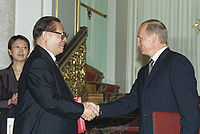2001 Sino-Russian Treaty of Friendship
| 2001 Sino-Russian Treaty of Friendship | |||||||||||||

Jiang Zemin and Vladimir Putin after signing the FCT
|
|||||||||||||
| Chinese name | |||||||||||||
|---|---|---|---|---|---|---|---|---|---|---|---|---|---|
| Traditional Chinese | 中俄睦鄰友好合作條約 | ||||||||||||
| Simplified Chinese | 中俄睦邻友好合作条约 | ||||||||||||
|
|||||||||||||
| Russian name | |||||||||||||
| Russian | Договор о Добрососедстве Дружбе и Сотрудничестве Между Российской Федерацией и Китайской Народной Республикой | ||||||||||||
| Transcriptions | |
|---|---|
| Standard Mandarin | |
| Hanyu Pinyin | Zhōng É mùlín Yǒuhǎo hézuò tiáoyuē |
| Yue: Cantonese | |
| Yale Romanization | jūng ngòh muhk lèuhn yáuh hóu hahp jok tiùh yeuk |
| Jyutping | zung1 ngo4 muk6 leon4 jau5 hou2 hap6 zok3 tiu4 joek3 |
The Treaty of Good-Neighborliness and Friendly Cooperation Between the People's Republic of China and the Russian Federation (FCT) is a twenty-year strategic treaty that was signed by the leaders of the two international powers, Jiang Zemin and Vladimir Putin, on July 16, 2001.
The treaty outlines the broad strokes which are to serve as a basis for peaceful relations, economic cooperation, as well as diplomatic and geopolitical reliance. Controversially, Article 9 of the treaty can be seen as an implicit defense pact, and other articles (A7 and A16) point at increasing military cooperation, including the sharing of "military know-how" (A16), namely, Chinese access to Russian military technology.
The treaty also encompasses a mutual, cooperative approach to environmental technology regulations and energy conservation; and toward international finance and trade. The document affirms Russia's stand on Taiwan as "an inalienable part of China" (A5), and highlights the commitment to ensure the "national unity and territorial integrity" in the two countries (A4).
Analysts have attributed the motives behind, and perceived mutual benefit of, the FCT to several factors.
The United States, Japan and the European Union are three economic powers who possess a skilled workforce and access to capital. Russia and the PRC can more effectively compete against these powers in the world economy, with Russia given access to Chinese capital and China given access to Russian training and technology.
...
Wikipedia
